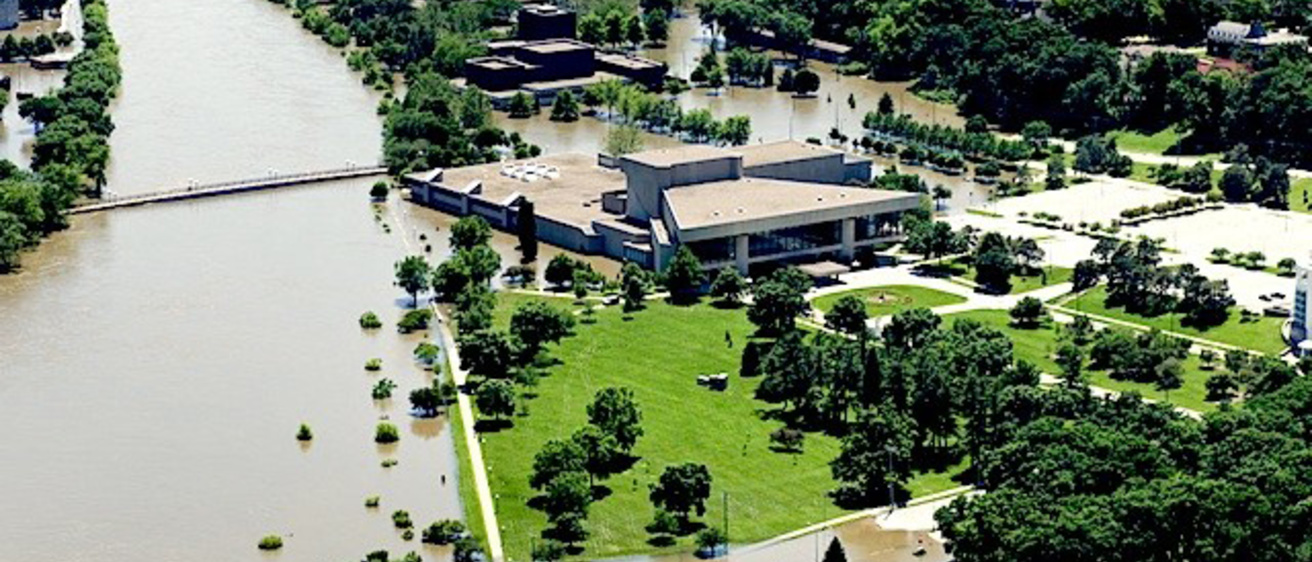University of Iowa President Sally Mason joined state and congressional leaders in praising the federal government’s decision Wednesday to reaffirm its commitment to provide $83 million for the replacement of Hancher Auditorium, School of Music, and studio arts buildings.
The decision resolves a dispute between the Federal Emergency Management Agency (FEMA) and U.S. Department of Homeland Security inspectors about whether to replace or repair the buildings, all severely damaged in the 2008 flood of the Iowa River.
"This final action on our replacement buildings clears the way for construction, and we are ready."
UI President Sally Mason
A report in June by the U.S. Department of Homeland Security's Office of Inspector General concluded that the buildings should be repaired instead of replaced, despite FEMA's determination that it would fund new construction on higher ground.
Mason says in a statement that the action clears the way for construction and allows the university to move forward with the projects.
“The students, faculty, and staff of the University of Iowa are grateful for the strong and continuous support of our congressional delegation, the governor, state legislature, and the Board of Regents,” she says. “This final action on our replacement buildings clears the way for construction, and we are ready. Our students and campus can now move forward with certainty that they will have the facilities they need.”
Iowa Gov. Terry Branstad and Lt. Gov. Kim Reynolds called settlement of the dispute “long overdue.”

“Department of Homeland Security leaders have reaffirmed FEMA’s previous commitments to the state and the University of Iowa,” Branstad and Reynolds said. “Thankfully, common sense has prevailed. We appreciate the Iowa congressional delegation’s active involvement in this issue and FEMA leadership’s openness to discuss our concerns throughout their policy dispute with the Department of Homeland Security Office of Inspector General.
“We recently wrote U.S. Secretary Janet Napolitano (view a copy of the letter) and encouraged other federal officials via phone to make a final decision before the October meeting of the Board of Regents,” Branstad and Reynolds continued. “It is unfortunate that this federal bureaucratic squabble dragged on for so long, but now the University of Iowa can finally move closer to a full recovery from the historic 2008 floods by expediting the replacement of these important facilities.”
Board of Regents President Craig Lang said the support of Iowa’s congressional delegation and Branstad was crucial to moving the decision forward, “and we are so thankful for their continued advocacy. Finally, the leadership and persistence at the University of Iowa has enabled students within the arts to achieve their academic goals under adverse circumstances and within temporary facilities. The opportunity to replace these facilities is long overdue.”
U.S. Rep. Dave Loebsack said, “It is great news that the Department of Homeland Security agreed with me that the university should not be penalized for a dispute between FEMA and the Office of the Inspector General, and I was happy to lead the charge in ensuring a positive outcome for the university. This is a great day for the University of Iowa, eastern Iowa, and the many students who will soon be able to again study in these buildings. I am pleased that after months of uncertainty, the University of Iowa is able to move forward with the rebuilding of the Hancher and Voxman-Clapp Music Building, and Art Building East. The University of Iowa is now able to move forward with their recovery from the flood and will be stronger and more resilient going into the future. I am pleased that I was able to work with Sens. Grassley and Harkin, Gov. Branstad, and the university to advocate for this favorable decision."
U.S. Sen. Tom Harkin issued this statement: “This is an important decision both for the University of Iowa and for the surrounding community. The delegation worked hard to resolve this issue and with today’s announcement, we are pleased that the university can move ahead to build these new facilities outside of the flood plain, as designated. It was simply not logical to spend large sums repairing buildings in the flood plain that will be flooded in the future. Going forward, I intend to work to change the underlying law so that FEMA decisions become final more quickly, assuring that this period of long uncertainty does not happen in the future.”
U.S. Sen. Charles “Chuck” Grassley stated, "This is a very good outcome, and it's a tribute to the strong case made by university and other state officials in Iowa. It's important that these replacement projects get underway so that the recovery from 2008 flood can continue."
Mark Schouten, administrator of the Iowa Homeland Security and Emergency Management Division, also issued a statement: “I am thankful that FEMA’s previous guidance to replace these facilities has been upheld. Replacing these facilities outside of the flood plain is in the best interest of taxpayers. This decision also avoids potentially serious and expensive complications that would have flowed from repairing buildings that have sat vacant for over four years, including mold removal and foundation stabilization measures.”
